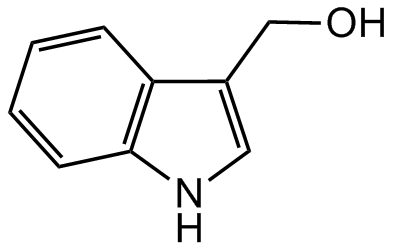
Chemical Structure
Indole-3-carbinol [700-06-1]

AG-CR1-3637
CAS Number700-06-1
Product group Chemicals
Estimated Purity>98%
Molecular Weight147.2
Overview
- SupplierAdipoGen Life Sciences
- Product NameIndole-3-carbinol [700-06-1]
- Delivery Days Customer10
- CAS Number700-06-1
- CertificationResearch Use Only
- Estimated Purity>98%
- Hazard InformationNon-hazardous,Warning
- Molecular FormulaC9H9NO
- Molecular Weight147.2
- Scientific DescriptionChemical. CAS: 700-06-1. Formula: C9H9NO. MW: 147.2. Natural breakdown product of glucosinolates found in cruciferous vegetables. Widely used multifunctional aryl hydrocarbon receptor (AhR) agonist. AhR is emerging as a transcription factor involved in the regulation of both innate and adaptive immune responses in various immune cell types, including lymphocytes and antigen-presenting cells (APCs). Studies have associated overexpression of AHR with the activation of cancer processes such as proliferation, epithelial-to-mesenchymal transition (EMT), DNA damage, inflammation, migration and angiogenesis. Used to increase the population of innate lymphoid cells 3 (ILC3) in gut microbiota. Chemopreventive agent that has multiple anticarcinogenic and antitumor properties and suppresses the proliferation of selective cancer cells, including breast cancer, prostate cancer, endometrial cancer, colon cancer and leukemic cells. Protects against nephrotoxicity. Proapoptotic. Induces cell cycle arrest at G1 and downregulates cell cycle-related proteins (CDK4, CDK6, cyclin D1 and pRb). Inhibits telomerase activity. SIRT1 activator. Antiobesity agent through inhibition of adipogenesis in adipocytes. Shown to have antioxidant, anti-inflammatory and anti-atherogenic effects. - Natural breakdown product of glucosinolates found in cruciferous vegetables. Widely used multifunctional aryl hydrocarbon receptor (AhR) agonist. AhR is emerging as a transcription factor involved in the regulation of both innate and adaptive immune responses in various immune cell types, including lymphocytes and antigen-presenting cells (APCs). Studies have associated overexpression of AHR with the activation of cancer processes such as proliferation, epithelial-to-mesenchymal transition (EMT), DNA damage, inflammation, migration and angiogenesis. Used to increase the population of innate lymphoid cells 3 (ILC3) in gut microbiota. Chemopreventive agent that has multiple anticarcinogenic and antitumor properties and suppresses the proliferation of selective cancer cells, including breast cancer, prostate cancer, endometrial cancer, colon cancer and leukemic cells. Protects against nephrotoxicity. Proapoptotic. Induces cell cycle arrest at G1 and downregulates cell cycle-related proteins (CDK4, CDK6, cyclin D1 and pRb). Inhibits telomerase activity. SIRT1 activator. Antiobesity agent through inhibition of adipogenesis in adipocytes. Shown to have antioxidant, anti-inflammatory and anti-atherogenic effects.
- SMILESOCC1=CNC2=C1C=CC=C2
- Storage Instruction2°C to 8°C,RT
- UNSPSC12352200
References
- Indole-3-carbinol inhibits the expression of cyclin-dependent kinase-6 and induces a G1 cell cycle arrest of human breast cancer cells independent of estrogen receptor signalling: C.M. Cover, et al.; J. Biol. Chem. 273, 3838 (1998)
- Indole-3-carbinol suppresses tumor-induced angiogenesis by inhibiting tube formation and inducing apoptosis: K. Kunimasa, et al.; Biosci. Biotechnol. Biochem. 72, 2243 (2008)
- Antiplatelet and antithrombotic activity of indole-3-carbinol in vitro and in vivo: M.K. Park, et al.; Phytother. Res. 22, 58 (2008)
- Review. Indole-3-carbinol as a chemoprotective agent in breast and prostate cancer: H.L. Bradlow; In Vivo 22, 441 (2008)
- Indole-3-carbinol improves survival in lupus-prone mice by inducing tandem B- and T-cell differentiation blockades: X.J. Yan, et al.; Clin. Immunol. 131, 481 (2009)
- Antiobesity activities of indole-3-carbinol in high-fat-diet-induced obese mice: H.P. Chang, et al.; Nutrition 27, 463 (2011)
- Indole-3-carbinol inhibits telomerase activity and gene expression in prostate cancer cell lines: S. Adler, et al.; Anticancer Res. 31, 3733 (2011)
- Indole-3-carbinol directly targets SIRT1 to inhibit adipocyte differentiation: Y. Choi, et al.; Int. J. Obes. (Lond) 37, 881 (2013)
- Indole-3-carbinol inhibits LPS-induced inflammatory response by blocking TRIF-dependent signaling pathway in macrophages: J. Jiang, et al.; Food Chem. Toxicol. 57, 256 (2013)
- Indole-3-carbinol, a vegetable phytochemical, inhibits adipogenesis by regulating cell cycle and AMPKalpha signalling: H.S. Choi, et al.; Biochimie 104, 127 (2014)
